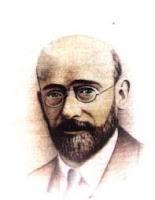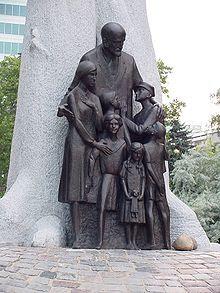
Janusz Korczak
He loved children so dearly that he opened an orphans society in Berlin and became so attached with the children that when the German Soldiers came to condemn all of them to death, he somehow persuaded the army men to take him with them. He knew that by doing this he was risking his own life. He could have escaped easily as he was asked by the army to leave. But he did not actually he could not. And he went with the children in train. And nothing is known about his whereabouts till now. He might have died with the children in the gas chambers.
He had become so attached with these children that he had also decreased his time for medical profession devoting most of his time to the children.
Joshua Perle, an eyewitness, described the procession of Korczak and the children through the ghetto to the Umschlagplatz (deportation point to the death camps):
- ... A miracle occurred. Two hundred children did not cry out. Two hundred pure souls, condemned to death, did not weep. Not one of them ran away. None tried to hide. Like stricken swallows they clung to their teacher and mentor, to their father and brother, Janusz Korczak, so that he might protect and preserve them. Janusz Korczak was marching, his head bent forward, holding the hand of a child, without a hat, a leather belt around his waist, and wearing high boots. A few nurses were followed by two hundred children, dressed in clean and meticulously cared for clothes, as they were being carried to the altar. (...) On all sides the children were surrounded by Germans, Ukrainians, and this time also Jewish policemen. They whipped and fired shots at them. The very stones of the street wept at the sight of the procession.

Korczak's evacuation from the Ghetto is also mentioned in Władysław Szpilman's book The Pianist:
One day, around 5th August, when I had taken a brief rest from work and was walking down Gęsia Street, I happened to see Janusz Korczak and his orphans leaving the ghetto. The evacuation of the Jewish orphanage run by Janusz Korczak had been ordered for that morning. The children were to have been taken away alone. He had the chance to save himself, and it was only with difficulty that he persuaded the Germans to take him too. He had spent long years of his life with children and now, on this last journey, he could not leave them alone. He wanted to ease things for them. He told the orphans they were going out in to the country, so they ought to be cheerful. At last they would be able to exchange the horrible suffocating city walls for meadows of flowers, streams where they could bathe, woods full of berries and mushrooms. He told them to wear their best clothes, and so they came out into the yard, two by two, nicely dressed and in a happy mood. The little column was led by an SS man who loved children, as Germans do, even those he was about to see on their way into the next world. He took a special liking to a boy of twelve, a violinist who had his instrument under his arm. The SS man told him to go to the head of the procession of children and play – and so they set off. When I met them in Gęsia Street, the smiling children were singing in chorus, the little violinist was playing for them and Korczak was carrying two of the smallest infants, who were beaming too, and telling them some amusing story. I am sure that even in the gas chamber, as the Zyklon B gas was stifling childish throats and striking terror instead of hope into the orphans' hearts, the Old Doctor must have whispered with one last effort, ‘it's all right, children, it will be all right’. So that at least he could spare his little charges the fear of passing from life to death
